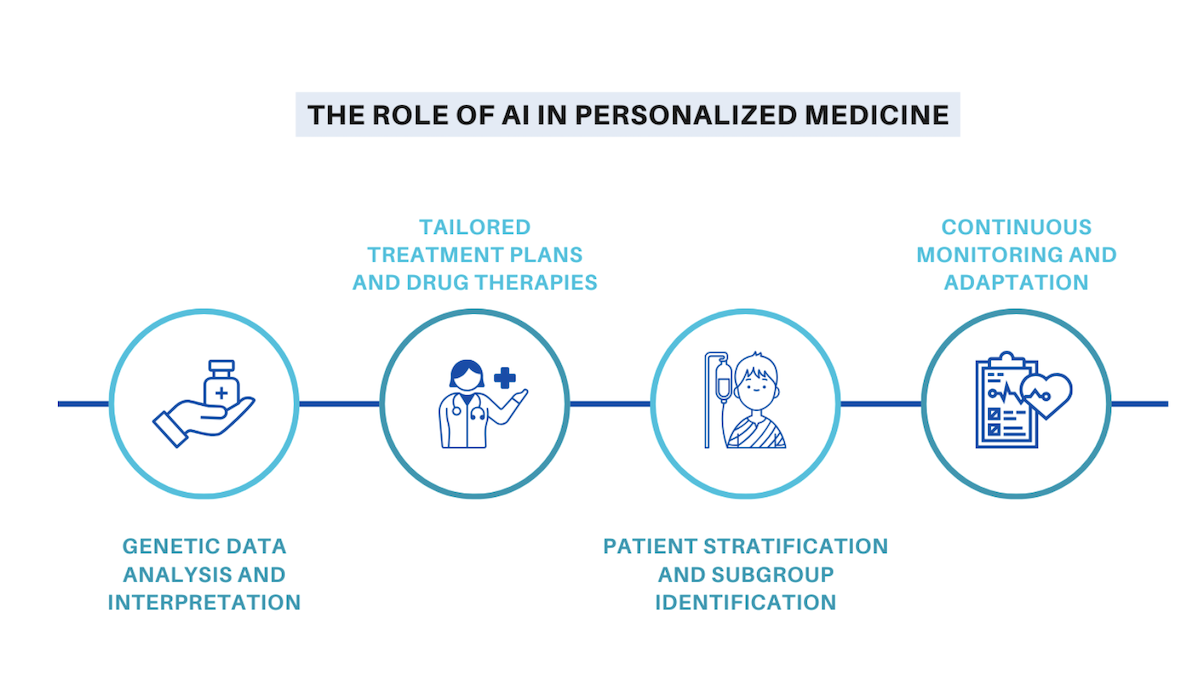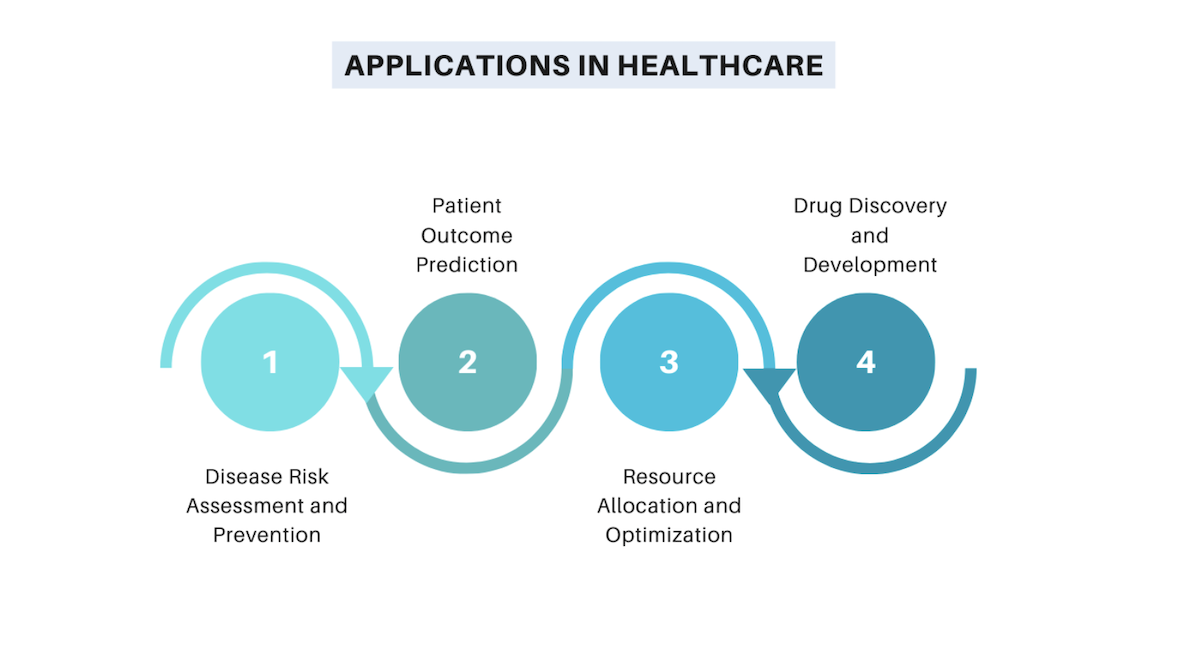Artificial intelligence (AI) is transforming the healthcare landscape, offering unprecedented opportunities for improvement and innovation. From streamlining clinical workflows to enhancing patient care, AI is revolutionizing the way healthcare professionals work and patients receive treatment. AI-powered chatbots and virtual assistants are enabling 24/7 patient support, while predictive analytics and machine learning algorithms are identifying high-risk patients and preventing costly readmissions. AI-driven medical imaging and diagnostics are improving accuracy and speed, enabling earlier detection and treatment of diseases.
Personalized medicine and targeted therapies are becoming a reality, thanks to AI's ability to analyze vast amounts of genetic and molecular data. Moreover, AI is helping to address healthcare's most pressing challenges, such as access, affordability and disparities, by enabling remote monitoring, telemedicine and population health management. As healthcare organizations seek to harness the full potential of AI, partnering with an experienced AI software development company can help them navigate the complexities of AI implementation and customization, ensuring seamless integration and maximum impact. As AI continues to evolve and improve, we can expect even more groundbreaking innovations that will transform the healthcare industry and improve patient lives.
Unlocking the Potential of Predictive Analytics and Personalized Medicine
Predictive analytics and personalized medicine are two crucial aspects of AI in healthcare, enabling healthcare providers to make data-driven decisions and tailor treatment plans to individual patients' needs.
By leveraging predictive analytics, healthcare professionals can identify high-risk patients, anticipate potential health issues and develop targeted interventions. Personalized medicine, on the other hand, allows for tailored treatment approaches, taking into account a patient's unique genetic profile, medical history and lifestyle factors. For instance, AI-powered genomics can help identify genetic mutations responsible for certain diseases, enabling targeted therapies and precision medicine. Additionally, predictive analytics can help identify patients at risk of developing chronic conditions, such as diabetes or heart disease, allowing for early interventions and preventative measures.
Furthermore, AI-driven personalized medicine can help optimize drug development, dosing and delivery, reducing adverse reactions and improving patient outcomes. By combining predictive analytics and personalized medicine, healthcare providers can deliver patient-centered care, ultimately improving health outcomes and reducing healthcare costs.
See also: How AI Could Set Premiums in Real Time
Key applications of AI include:
1. Disease Risk Assessment and Prevention:
Predictive analytics helps identify high-risk patients, enabling healthcare providers to develop targeted interventions and preventive measures. By analyzing patient data, predictive models can detect early warning signs of chronic diseases, such as diabetes, cardiovascular disease and cancer. For instance, predictive analytics can help identify patients at risk of developing diabetes by analyzing factors such as blood pressure, weight and family history. This enables healthcare providers to develop personalized prevention plans, including lifestyle changes and medication, to prevent or delay the onset of diabetes.
Similarly, predictive analytics can help identify patients at risk of cardiovascular disease, allowing healthcare providers to develop targeted interventions to reduce the risk of heart attack or stroke. Additionally, predictive analytics can help detect early signs of cancer, enabling healthcare providers to develop personalized treatment plans and improve patient outcomes. By leveraging predictive analytics, healthcare providers can deliver patient-centered care, reducing the burden of chronic diseases and improving overall health outcomes.
2. Patient Outcome Prediction:
Predictive analytics helps healthcare professionals anticipate patient outcomes, enabling them to develop personalized treatment plans and improve patient care. By analyzing patient data, predictive models can forecast patient responses to different treatments, reducing the risk of adverse events and improving health outcomes. For example, predictive analytics can help healthcare professionals identify patients at high risk of readmission to hospital, enabling them to develop targeted interventions and reduce readmission rates. Additionally, predictive analytics can help healthcare professionals optimize medication dosing and reduce the risk of adverse drug reactions.
Furthermore, natural language generation technology can be used to create clear and concise patient reports, enabling healthcare professionals to quickly and easily communicate complex patient data to patients and their families, improving patient understanding and engagement. By leveraging predictive analytics and natural language generation, healthcare professionals can deliver more effective, efficient and patient-centered care, ultimately improving patient outcomes and reducing healthcare costs.
3. Resource Allocation and Optimization:
Predictive analytics helps healthcare organizations optimize resource allocation, reducing costs and improving efficiency. By analyzing patient flow, staff workload, and resource utilization, predictive models can identify areas of improvement, enabling healthcare professionals to make data-driven decisions. For instance, predictive analytics can help hospitals optimize bed capacity, reducing wait times and improving patient satisfaction. Additionally, predictive analytics can help healthcare organizations identify high-risk patients, enabling early intervention and reducing readmission rates.
4. Drug Discovery and Development:
Predictive analytics plays a crucial role in drug discovery and development, enabling researchers to identify potential drug targets, predict drug efficacy and optimize drug development processes. By analyzing large datasets, predictive models can identify patterns and correlations, accelerating the development of new treatments and therapies. For instance, predictive analytics can help researchers:
- Identify potential drug targets by analyzing gene expression data and protein structures.
- Predict drug efficacy by simulating drug interactions and pharmacokinetics.
- Optimize drug development processes by identifying potential bottlenecks and areas for improvement.
- Develop personalized medicine approaches by analyzing patient data and genetic profiles.
- Improve drug safety by predicting potential side effects and toxicities.

Personalized Medicine and AI: Revolutionizing Healthcare With Tailored Treatments:
Artificial intelligence (AI) plays a crucial role in personalized medicine, enabling healthcare professionals to analyze vast amounts of data, identify patterns and make informed decisions. AI's applications in personalized medicine include:
1. Genetic Data Analysis and Interpretation:
AI helps analyze genetic data, identifying genetic variations and correlations with specific diseases or conditions. This information enables healthcare professionals to develop targeted treatments and therapies.
2. Tailored Treatment Plans and Drug Therapies:
AI helps develop personalized treatment plans and drug therapies based on individual patient characteristics, medical history, and genetic profiles.
3. Patient Stratification and Subgroup Identification:
AI helps identify patient subgroups with similar characteristics, enabling healthcare professionals to develop targeted interventions and treatments.
4. Continuous Monitoring and Adaptation:
AI enables continuous monitoring of patient data, allowing healthcare professionals to adapt treatment plans and therapies as needed.

Examples of AI-Driven Personalized Medicine in Practice:
Cancer treatment: AI helps identify genetic mutations and develop targeted therapies, improving treatment outcomes and reducing side effects.
Pharmacogenomics: AI helps predict patient responses to medications, enabling healthcare professionals to prescribe personalized drug therapies.
Rare disease diagnosis: AI helps identify rare genetic disorders, enabling healthcare professionals to develop targeted treatments and therapies.
See also: Insurance: An Industry Embracing AI
The Double-Edged Sword of AI in Healthcare: Benefits and Challenges
AI has the potential to revolutionize healthcare, offering numerous benefits, including:
1. Improved Accuracy and Efficiency:
AI can analyze vast amounts of data quickly and accurately, reducing errors and improving diagnosis and treatment.
2. Enhanced Patient Experience and Engagement:
AI-powered chatbots and virtual assistants can provide personalized support and engagement, improving patient satisfaction and outcomes.
3. Increased Accessibility and Reduced Costs:
AI can help expand healthcare access to remote and underserved areas, reducing costs and improving health equity.
While AI holds great promise, it also presents several challenges and limitations, including:
1. Data Quality and Privacy Concerns:
AI relies on high-quality data, which can be scarce or compromised by privacy concerns and data breaches.
2. Regulatory and Ethical Considerations:
AI raises ethical concerns, such as bias and transparency, and requires regulatory frameworks to ensure responsible use.
3. Integration With Existing Healthcare Systems:
AI must be integrated with existing healthcare systems, requiring significant investment and infrastructure upgrades.
By acknowledging both the benefits and challenges of AI in healthcare, we can harness its potential while addressing the complexities and limitations. By recognizing the benefits of AI, such as improved diagnosis accuracy and enhanced patient experience, we can leverage these advantages to drive innovation and progress. At the same time, by acknowledging the challenges, such as data privacy concerns and potential biases, we can address these issues and ensure that AI is used responsibly and ethically.
Through this balanced approach, we can ensure that AI is used to augment and support healthcare professionals, rather than replace them. We can also prioritize transparency and accountability in AI decision-making, ensuring that patients and healthcare providers alike understand how AI-driven insights are generated and used. By working together to address the complexities and limitations of AI in healthcare, we can create a more sustainable and equitable healthcare system that prioritizes patient well-being and dignity. Ultimately, this balanced approach will enable us to harness the full potential of AI to improve healthcare outcomes and transform the lives of patients and healthcare professionals alike.
See also: Streamlining Medical Record Reviews Via AI
Real-World Impact: AI-Driven Predictive Analytics and Personalized Medicine in Action:
Case Study 1: Predicting Patient Outcomes in ICU:
Setting: Intensive Care Unit (ICU) in a tertiary care hospital
Challenge: High mortality rates and prolonged ICU stays
Solution: AI-driven predictive analytics to identify high-risk patients and optimize treatment
Impact: 30% reduction in ICU mortality rates and 25% reduction in ICU length of stay
Case Study 2: Personalized Cancer Treatment:
Setting: Oncology department in a cancer center
Challenge: Limited treatment options and high toxicity rates
Solution: AI-driven personalized medicine to identify optimal treatment plans based on genetic profiles
Impact: 40% increase in treatment response rates and 30% reduction in toxicity rates
Case Study 3: Early Detection of Chronic Diseases:
Setting: Primary care clinic in a rural area
Challenge: Limited access to specialized care and high prevalence of chronic diseases
Solution: AI-driven predictive analytics to identify high-risk patients and enable early intervention
Impact: 25% reduction in chronic disease incidence and 30% improvement in patient engagement
These real-world examples demonstrate the potential of AI-driven predictive analytics and personalized medicine to transform healthcare outcomes. By leveraging AI, healthcare professionals can make data-driven decisions, improve patient care and reduce costs. These success stories showcase the value of AI in healthcare, providing inspiration and guidance for future implementations. For instance, AI-powered predictive analytics can help identify high-risk patients and prevent hospital readmissions, reducing healthcare costs and improving patient outcomes. Additionally, AI-driven personalized medicine can help tailor treatment plans to individual patients' needs, leading to more effective treatments and better health outcomes.
Moreover, AI can help healthcare professionals stay up-to-date with the latest medical research and guidelines, ensuring that patients receive the best possible care. AI-powered chatbots and virtual assistants can also help patients manage their health and communicate with healthcare professionals more effectively, improving patient engagement and experience. Embracing AI and predictive analytics ultimately leads to better health and well-being for individuals and communities worldwide. By learning from these success stories and exploring new applications of AI in healthcare, we can continue to drive innovation and improvement in patient care.
Unlocking the Future of Healthcare: Emerging Trends and Possibilities
Advancements in AI and Healthcare:
Explainable AI: Developing transparent and interpretable AI models to build trust and understanding in healthcare decision-making
Edge AI: Enabling real-time AI processing at the edge of healthcare systems, reducing latency and improving response times
Federated Learning: Collaborative AI training across healthcare organizations, enhancing data privacy and security
Potential Applications and Areas of Growth:
Personalized Medicine 2.0: Integrating AI-driven genomics, precision medicine and targeted therapies for tailored patient care
AI-Assisted Clinical Trials: Streamlining trial design, patient recruitment and data analysis for faster and more efficient drug development
Virtual Healthcare Assistants: AI-powered chatbots and virtual assistants for patient engagement, education and support
Future Possibilities and Implications:
Transforming Healthcare Workforce: AI augmenting human capabilities, enabling healthcare professionals to focus on high-value tasks and patient care
Health Equity and Access: AI-driven healthcare expanding access to underserved populations, reducing health disparities and improving global health outcomes
Ethical Considerations: Addressing AI-driven healthcare's ethical implications, ensuring responsible innovation and prioritizing patient well-being
By embracing emerging trends and advancements in AI and healthcare, we can unlock new possibilities for patient care, healthcare workforce transformation and global health equity. This future-focused approach will enable us to harness AI's potential, creating a more compassionate healthcare system for all. By leveraging AI, we can develop personalized treatment plans tailored to individual patients' needs, improving health outcomes and reducing costs. AI-powered chatbots and virtual assistants can also enhance patient engagement and experience, providing 24/7 support and empowering individuals to take charge of their health.
Furthermore, AI can help address healthcare workforce challenges, such as burnout and shortages, by streamlining administrative tasks and freeing clinicians to focus on high-value care. AI-driven analytics can also identify trends and patterns, enabling healthcare professionals to make data-driven decisions and create quality improvement initiatives. Additionally, AI can help bridge the gap in global health equity, expanding access to healthcare services and improving health outcomes in underserved populations.
By prioritizing responsible AI development and deployment, we can ensure that these benefits are equitably distributed and that AI works for everyone. This requires collaboration from healthcare providers, tech innovators, policymakers and patients themselves, working together to shape a future where AI enhances human care, rather than replacing it.
Conclusion: Harnessing AI's Potential in Healthcare
Recap of Key Points:
- AI is revolutionizing healthcare through predictive analytics and personalized medicine
- Emerging trends and advancements in AI and healthcare offer vast potential for growth and improvement
- Ethical considerations and responsible innovation are crucial for AI-driven healthcare
The future of AI in healthcare holds immense promise but requires collaboration and further research to fully realize its potential.






